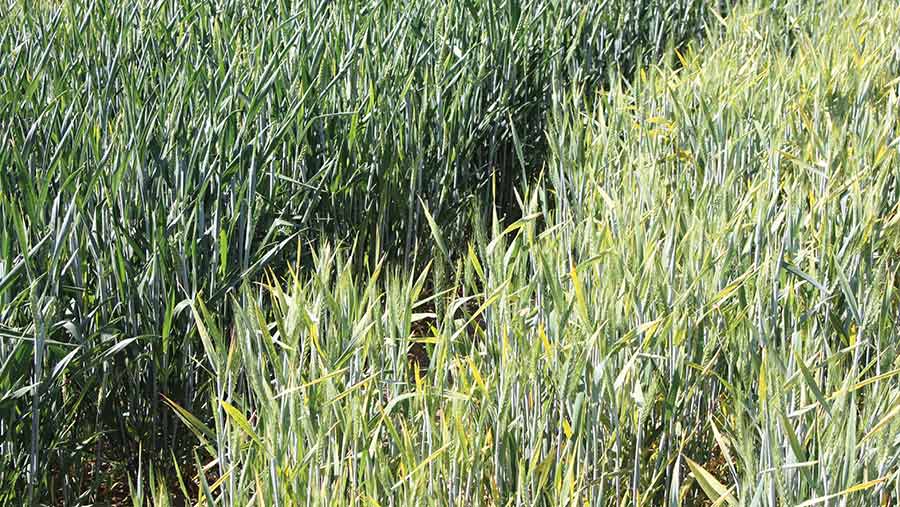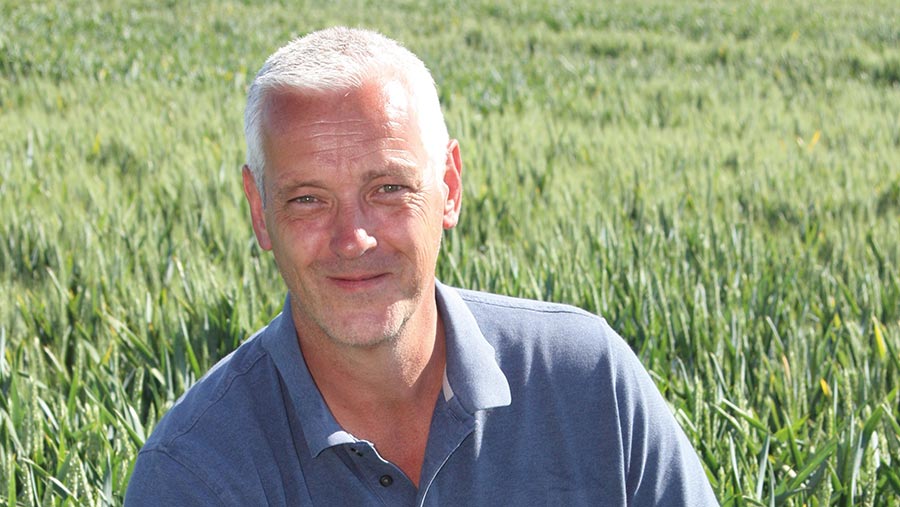Why demand is expected to be strong for virus-resistant wheat
 Wheat with the Bdv2 gene (left) and a non-Bdv2 crop © RAGT
Wheat with the Bdv2 gene (left) and a non-Bdv2 crop © RAGT Insecticide-free wheat has moved a step closer with the arrival of the hard Group 4 winter wheat variety Wolverine, which is the first to offer barley yellow dwarf virus (BYDV) resistance.
Added to the latest AHDB Recommended List on a yield of 102%, Wolverine has a specific recommendation for resistance to BYDV and sets an exciting tone for future wheat variety introductions from breeder RAGT, many of which will have resistance to both BYDV and orange wheat blossom midge.
See also: How a carbon pilot is opening up a direct market for farmers
While Wolverine is a high-yielding feed variety, the company also has bread-making wheats with both types of resistance in development – many of which should eliminate the need to apply insecticides throughout the entire growing season.
Against a background of the loss of insecticidal seed treatments, rising resistance levels in pests to the remaining foliar sprays and greater scrutiny of pesticide use, the development of these varieties is a breakthrough.
Their arrival is expected to be as well-received by the supply chain as it is by farmers, in the industry’s quest to sharpen its environmental credentials.
Seed demand
After a limited seed release last year ahead of the recommendation decision, there is enough seed of Wolverine available to meet demand for this autumn’s wheat plantings, RAGT managing director Lee Bennett confirms.
He believes the variety could take a significant market share.

Lee Bennett © RAGT
“The ideal situation is to have this BYDV resistance in a variety that suits early drilling,” he says. “That’s exactly what we have in Wolverine.”
After two consecutive wet autumns and difficulties with wheat drilling schedules, the opportunity for farmers to get under way while conditions are good, without putting the crop at unnecessary risk from virus-carrying aphids, is a bonus, he notes.
“This will be the second year without the Deter (clothianidin) seed treatments that gave such cost-effective control. The approval of Wolverine gives them a different, more environmentally friendly solution.”
Genetic solution
The genetic alternative to chemical control is performing well in the field, says his colleague Tom Dummett, who confirms that the Bdv2 gene used in Wolverine brings season-long protection from the aphids that transmit the virus.
“The aphids still arrive, but Wolverine doesn’t express any virus symptoms and the virus doesn’t multiplicate in the plant,” he explains.
“We’re very happy with the way that the gene is working. It’s proved effective in Australia for almost 20 years and is now in the right genetic background to work well in the UK.”
Having previously conducted trials to look at the value of the resistance at different sowing dates and whether the use of one insecticide spray could protect the gene or give a yield uplift, this year’s work by RAGT has a different focus.
The plots were all drilled in early September and then inoculated with aphids infected with the PAV strain of BYDV, both in the autumn and the spring.
BYDV pressure
The idea was to create severe BYDV pressure, explains Mr Dummett, with one-third being left untreated, one-third receiving an autumn insecticide, and the remaining plots getting both an autumn and spring insecticide.
At the time of Farmers Weekly‘s visit in June, varieties without the BYDV resistance gene were showing clear symptoms of the virus in the untreated plots.
Wolverine and the other RAGT lines with the Bdv2 gene were symptom-free.
The PAV strain of BYDV is the most common, Mr Dummett says, but the company is confident that the resistance is broad-spectrum as tests have confirmed that it also controls the MAV and RPV strains.
Wolverine’s agronomic features
Agronomically, Wolverine is a later-maturing type, with a +2 for ripening.
It has stiff straw and good resistance to brown rust, but is middle-of-the-road for septoria (5.3) and did take on some yellow rust last year, so has a score of 5. As such, it needs to be grown with care and frequent monitoring.
Seed cost
The previous cost of using Deter (clothianidin) seed treatments and an insecticide for BYDV control has been factored into the cost of growing Wolverine.
As it was last year, the variety will be sold via the Breeders’ Intellectual Property Office system, which means that the value of the trait will be charged direct to farmers on an area basis rather than by tonnage.
That charge will be £33/ha, and RAGT points out that it covers season-long protection and eliminates the need to monitor aphid populations or repeatedly spray at a busy time of year.
Competitive advantage
RAGT has a head start over other breeding companies when it comes to BYDV resistance, as it is the only UK plant breeder with Bdv2.
The company has two feed wheat varieties coming along closely behind Wolverine, followed by four bread-making types with both BYDV and orange wheat blossom midge resistance.
The Bdv2 gene originated in goat grass and was translocated onto a wheat chromosome by Australian researchers, who went on to breed BYDV-resistant wheats.
There are four other known BYDV resistance genes, most of which are being investigated by RAGT. Bdv3 and Bdv4 work differently to Bdv2, for example, but may bring other benefits when put into the right genetic background.

